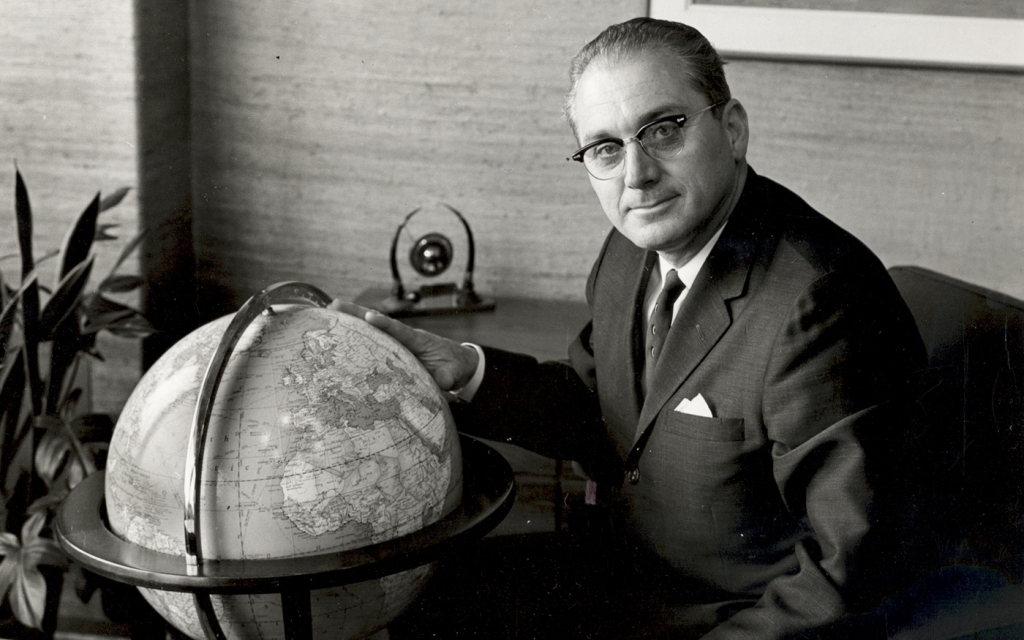J. Philip Hogan: From Rural Colorado to Assemblies of God World Missions Leader
This Week in AG History–November 27, 1960 By Ruthie Edgerly ObergOriginally published on AG News, 30 November 2023 James Philip Hogan (1915-2002) was deeply committed to fulfilling the Great Commission of Jesus Christ under the power of the Holy Spirit. He … Continue reading

This Week in AG History–November 27, 1960
By Ruthie Edgerly Oberg
Originally published on AG News, 30 November 2023
James Philip Hogan (1915-2002) was deeply committed to fulfilling the Great Commission of Jesus Christ under the power of the Holy Spirit. He brought leadership to the world missions efforts of the Assemblies of God that generated explosive growth through strategic planning coupled with Pentecostal dependence on the Spirit. His initiative and influence over 30 years as World Missions director led to growth from 788 missionaries in 69 nations to more than 1,500 missionaries in 120 countries and a cohesive relationship between national churches.
Born on a small ranch in Colorado in 1915, Hogan knew hard work from childhood. Coming of age during the Great Depression and entering adulthood during a time of world war gave him a perspective that valued ingenuity and sharpened a sense of responsibility when facing seemingly impossible tasks.
When two traveling evangelists, Bessie Bell and Eva Edith Morton, brought Pentecostal teaching to the part of Colorado where the Hogan family lived in 1920, they quickly responded to the message and soon a small group were meeting in their home. At the age of 7, Philip surrendered his life to Christ and at age 9 was filled with the Holy Spirit. In 1933 the family moved to Springfield, Missouri, where Hogan attended Central Bible Institute (CBI, now Evangel University).
While at CBI, Hogan pastored a small church in Republic, Missouri, and became acquainted with Virginia Lewis. Virginia felt a call to missions from her youth and Hogan feared that her call would take her away from him. Showing a persistence that would mark his entire life, he proposed marriage and the two were wed in 1937.
After pastorates in Missouri and Ohio, the couple moved to River Rouge, Michigan, and in 1944 hosted a missions convention with Leonard Bolton of China and Willis Long of India. After one of the services a kind woman in the congregation sensed that her pastor’s wife needed to spend time at the altar and offered to take the Hogan children to the nursery. Weeping with the burden for souls that had been hers for many years, Virginia felt the Lord say, “This (China) is the place.” She replied that God would have to call her husband to missions work as she could not.
Meanwhile, Hogan spent late hours talking to Bolton and found himself stirred toward the need of the nations of the world, as well. He began going to the Detroit Public Library and reading every book he could find on China. He also attended a Chinese mission in downtown Detroit on Sunday afternoons. In 1945, on a Christmas visit to their families in Springfield, J. Philip and Virginia Hogan met with Noel Perkin to see how they might be able to help in missions efforts. After a 30-minute meeting, they found themselves tentatively appointed to China. Returning home, they resigned their church and began taking classes in Mandarin at the University of California, Berkeley. In February 1947, they sailed for China.
Their arrival in China coincided with the beginning of the Communist Revolution. They worked tirelessly to support the church, orphanage, and Bible school that was started by Christian Missionary Alliance worker, Nettie Nichols, but by 1948 threats against Chinese Christians who worked with Western missionaries were such that the Hogans felt that their presence caused danger. Encouraging the church workers to rely fully on Chinese leadership and to trust the Holy Spirit, they moved to Taiwan and began a small work there. Within a year, the situation in Taiwan worsened to the point that the U.S. Consul advised all Americans to leave the island. Hogan sent Virginia and the children back to the United States and stayed for another six months to train and prepare his young church to be self-supporting. When he left, there were 70 committed Christians in the church.
Upon returning to the States, he found that there were many churches that wanted to hear about the “Bamboo Curtain” that was descending across the East. For six months, he traveled tirelessly promoting missions to Assemblies of God churches. His anointed eloquence in expressing the need of world missions made him a much sought after speaker at missions conventions and District Councils. Seeing his potential, Noel Perkin invited Hogan to become the World Missions promotional director in 1952.
Hogan immediately identified three needs: the many countries without a Pentecostal missionary, the necessity of more men and women to serve in these countries, and the thousands of Assemblies of God churches who were not involved in supporting world missions.
At the 1959 General Council, Hogan presented a three-prong approach to world missions, named “Global Conquest.” At this same council, Noel Perkin retired as World Missions director after serving faithfully for 32 years. At only 43, and with only three years of service on the field, the Assemblies of God voted in Hogan as his replacement.
One of Hogan’s first initiatives was to target large population areas with mass evangelism. Seoul, Korea, was chosen as the pilot effort. In 1962, evangelist Sam Todd conducted a tent crusade and many Koreans accepted Christ as Savior. A young Korean Bible school student, Paul Yonggi Cho, was chosen to lead the new church. After the success of the Korean effort, “Good News Crusades” were then held in other large cities around the world.
In 1966, Hogan commissioned missionary George Flattery to develop a curriculum to train pastors worldwide who could not attend a formal Bible school. With Hogan’s unwavering support, Flattery founded International Correspondence Institute (now Global University).
Under Hogan’s leadership, the Center for Ministry to Muslims, International Media Ministries, and HealthCare Ministries of the Assemblies of God were also formed, along with theological seminaries in West Africa, the Philippines, and Belgium. At the end of the 1980s, Hogan’s vision for a “Decade of Harvest” led to the formation of the World Assemblies of God Fellowship to coordinate the efforts of national churches for world evangelism.
Hogan retired as World Missions director in 1989, after serving for 30 years in the position. He continued to serve as chairman of the World Assemblies of God Fellowship until 1992 when he passed the baton to the young Korean Bible school student he met so many years before, David (Paul) Yonggi Cho. As much as any Pentecostal leader, he exemplified a life that sought to balance strategic planning with a conviction of the necessity of following the leadership of the Holy Spirit. J. Philip Hogan passed away in 2002 at the age of 86 still believing that “we will advance on our knees or we will not advance at all.”
Read J. Philip Hogan’s “Call to Action” column on page 8 of the Nov. 27, 1960, issue of the Pentecostal Evangel.
Also featured in this issue:
• “Back from Siberia,” by Ruth Demetrus
• “Stairway to the Stars,” by Charlotte Schumitsch
And many more!
Click here to read this issue now.
Pentecostal Evangel archived editions courtesy of the Flower Pentecostal Heritage Center.
Do you have Pentecostal historical materials that should be preserved? Please consider depositing these materials at the Flower Pentecostal Heritage Center (FPHC). The FPHC, located in the Assemblies of God national offices, is the largest Pentecostal archive in the world. We would like to preserve and make your treasures accessible to those who write the history books.
Flower Pentecostal Heritage Center
1445 North Boonville Avenue
Springfield, Missouri 65802 USA
Phone: 417.862.1447 ext. 4400
Toll Free: 877.840.5200
Email: archives@ag.org
Website: www.iFPHC.org

